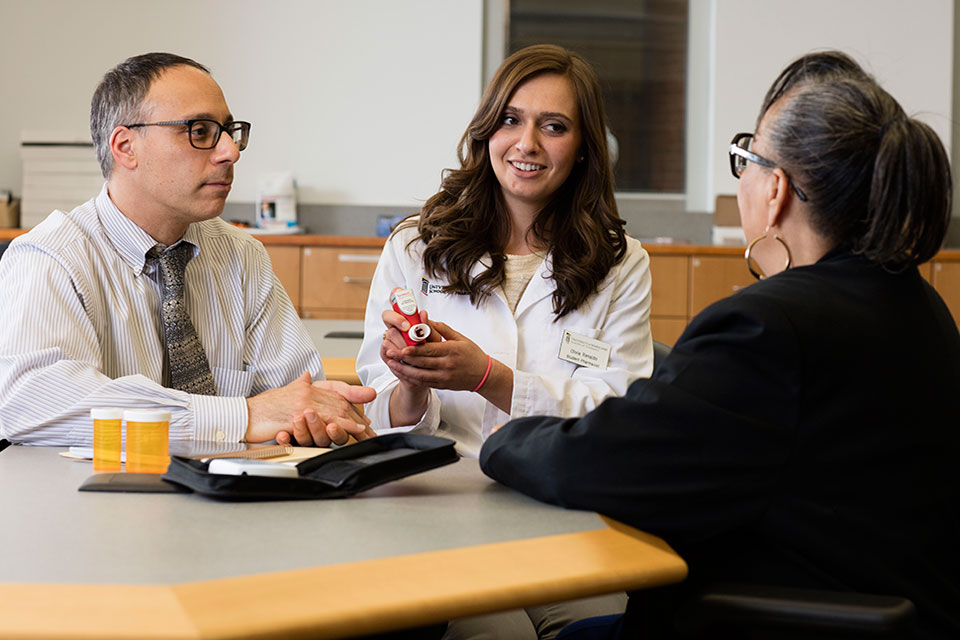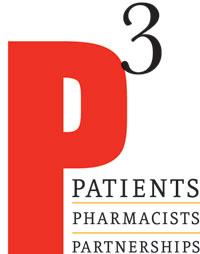SOP CIPS Program Responds to Expanding Needs of Health Care Reform
Knowledge Enterprise, an online continuing education portal for pharmacists, is part of the School’s ‘game-changing’ Center for Innovative Pharmacy Solutions.

By Steve Berberich
November 12, 2012
In response to ongoing state and national health care reforms, the University of Maryland School of Pharmacy has begun offering pharmacists nationwide a set of online and hands-on training courses to help them better manage patients’ chronic diseases.
In recent years, the traditional role of the pharmacist has undergone a makeover with greater emphasis on monitoring and managing patient care and creating new opportunities in integrated health care partnerships. The School of Pharmacy’s new Knowledge Enterprise is an online platform launched last month to provide the education pharmacists need to meet the growing demands on the profession.
The first course offered was Essentials of Rx for Asthma, which has 75 pharmacists enrolled. The courses are offered through the School’s comprehensive Center for Innovative Pharmacy Solutions (CIPS) in its Department of Pharmacy Practice and Science (PPS).
“The CIPS Knowledge Enterprise meets the growing needs of pharmacists and their employers in providing evidence-based, educational, sound online and hands-on training pharmacists must have to meet the needs of patients” says Magaly Rodriguez de Bittner, PharmD, CDE, FAPhA, professor and chair of the PPS and executive director of CIPS. “The CIPS Knowledge Enterprise is an essential tool in training pharmacists on the delivery of novel and innovative comprehensive medication therapy management models of care.”
Arnold Kaplan, a 37-year veteran pharmacist in Baltimore who completed the asthma course, says, “Our business models for pharmacies should include the time and compensation needed to help asthma patients. What we learned in this asthma course provides an opportunity for a whole new look at our patients.”
The asthma course is typical of the offerings available through the CIPS Knowledge Enterprise, including online instruction as well as hands-on training in a classroom for pharmacists to practice and discuss with each other the latest techniques for using inhalers and other state-of-the-medicine asthma therapies. The Maryland Department of Health and Mental Hygiene (DHMH) sponsored the course. Rachel Hess-Mutinda, MSW, asthma program coordinator with DHMH, says hospital admissions for asthma patients are increasing. “The idea [of the new training] is to manage asthma before it becomes difficult to treat. Prevention is always the best way. And the pharmacist is essentially the best health care worker in the community. They have the unique ability to work with patients and other health care professionals,” says Hess-Mutinda.
Another student in the asthma course, Carla Showacre, who is a pharmacist at the Anne Arundel Medical Center in Annapolis, Md., wants to take the course information to her hospital’s wellness program. “The information we learned here can help our hospital pharmacists improve their communication with patients,” she says.
The School’s new courses are being developed in partnership with the award-winning e-Learning and instructional design experts at Connect For Education, Inc. of Reston, Va., and powered by the company’s learning technologies that provide a truly interactive, collaborative, robust, self-paced, and user-friendly online environment where students have multiple opportunities to acquire and test-drive new, meaningful skills. Each module is updated regularly to reflect emerging research and user feedback. Other courses in the CIPS Knowledge Enterprise will cover pharmacist-delivered medication management strategies for hypertension, diabetes, and a pharmacist ‘tool kit’ for cardiovascular health.
For pharmacists who are expanding their roles in health care, CIPS and its Knowledge Enterprise are “game changers,” says Mona Tsoukleris, PharmD (pictured above), an associate professor in PPS. “We have a perfect storm for community pharmacy. We need to seize that energy. Pharmacists are the most accessible health care providers for patients and now we have the government’s backing through funding from DHMH for this program,” says Tsoukleris.
The concept of CIPS was launched by the School of Pharmacy about four years ago, as a response to health care needs in the state and nationally. In June 2011, the School held a National Leadership Roundtable of leaders from pharmacy, medicine, health insurers, and state and federal government agencies. The assembled consortium recommended training, research, and advocacy models to guide pharmacists nationwide in assuming expanded needs outlined in health care reform efforts. “The pharmacist is in a unique position,” says Tsoukleris, and the CIPS Knowledge Enterprise’s asthma training course is “the first of many such modules available to assist pharmacists nationwide to assume expanded health care reform needs,” she says.
Rodriguez de Bittner says “the story of CIPS is how we are responding to the pharmacy profession’s needs when it comes to health care reform. The national roundtable in 2011 helped confirm the role that CIPS has locally and nationally in training and developing new care models to deliver medication management services. We have been able to demonstrate how pharmacist’s services improve care and reduce overall health care costs.”
So far, the School has raised $1.1 million in grants for CIPS training, research for new models of care, and advocacy, says Rodriguez de Bittner. “There are other training programs, but what is unique about us is that any model we test, we have an accompanying business model,” she says. “It is not just developing a program and testing it to assess the patient care piece, but we are also looking for financially sustainable models within this new structure of health care reform. We are testing models in a variety of settings, including our Patient Centered Medical Home Program, and the Maryland P3 [Patients, Pharmacists, Partnerships] Program.”
The Maryland General Assembly passed legislation in 2010 establishing the Maryland Multipayer Patient Centered Medical Home Program, which is evaluating whether the patient-centered medical home program, using multiple data sources such as claims, interviews, and medical records, improves health care quality, health outcomes, while reducing the cost of care. And the Maryland P3 Program provides employers with specially trained pharmacist coaches for step-by-step guidance in medication adherence, lifestyle changes, and self-care skills. Employers who have signed up are saving about $1,000 per employee per year in health care expenses.
Immediately following the initial CIPS asthma class, Tsoukleris summarized, “We have people still dying of asthma and almost every death is preventable. You shouldn’t have to die from asthma. We as pharmacists need to spend the time even in small increments to improve the situation.”



